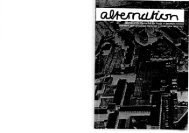Re-reading The Purloined Letter - Alternation Journal
Re-reading The Purloined Letter - Alternation Journal
Re-reading The Purloined Letter - Alternation Journal
Create successful ePaper yourself
Turn your PDF publications into a flip-book with our unique Google optimized e-Paper software.
Pravina Pillay<br />
what they misrecognized is that the curse is not in the letter as such but in<br />
the intersubjecive network organized around it.<br />
Žižek (1992:20) examines the concept of the <strong>Re</strong>al and again agrees<br />
with Lacan that ‘a letter always arrives at its destination’. This in effect<br />
means that ‘we will all die’. It is the only letter that nobody can evade: the<br />
letter which has each of us as its infallible addressee is death. It is important<br />
to note that the <strong>Re</strong>al is also associated with life. Lacan (1992:22) points out<br />
that the very notion of life is alien to the symbolic order. <strong>The</strong> name of this<br />
life substance that proves a traumatic shock for the symbolic universe is<br />
enjoyment. Žižek (1992:22) sees the ultimate variation on the theme of ‘a<br />
letter always arrives at its destination’ as ‘you can never get rid of the stain<br />
of enjoyment’—the very gesture of renouncing enjoyment, produces a<br />
surplus enjoyment that Lacan (1992:22) calls ‘object small a’.<br />
In his concluding remarks on <strong>The</strong> <strong>Purloined</strong> <strong>Letter</strong>, Žižek (1992:22)<br />
states that its story stays within the confines of the ‘structuralist’ problematic<br />
of a senseless, ‘mechanical’ symbol order regulating the subject’s innermost<br />
self-experience. Žižek (1992:22) contends that if one looks at the last years<br />
of Lacan’s teaching, the letter which circulates among the subjects in Poe’s<br />
story, determining their position in the intersubjective network, is no longer<br />
the materialized agency of the signifier but rather an object in the strict sense<br />
of materialized enjoyment—the stain, the uncanny exists that the subjects<br />
snatch away from each other, forgetful of how its very possession will mark<br />
them with a passive ‘feminine’ stance that bears witness to the confrontation<br />
with the object—the cause of desire.<br />
I would suggest that Žižek’s attempt at defending Lacan’s seminar<br />
lacks substance. He fails to defend Lacan against the numerous charges<br />
made by Derrida. Žižek’s entire defense is centered on one of Derrida’s<br />
objections against which he piles up his counter-argument.<br />
5 Conclusion<br />
I have attempted in my essay to show the complex <strong>reading</strong>s which have<br />
formed around <strong>The</strong> <strong>Purloined</strong> <strong>Letter</strong>, with special reference to Lacan,<br />
Derrida and Žižek. It is imperative to note Freud’s influence on Lacan’s<br />
<strong>reading</strong> of <strong>The</strong> <strong>Purloined</strong> <strong>Letter</strong>. However, it is also evident that Lacan<br />
neglects to mention <strong>The</strong> Uncanny, and Derrida considers it to be one of the<br />
398

















